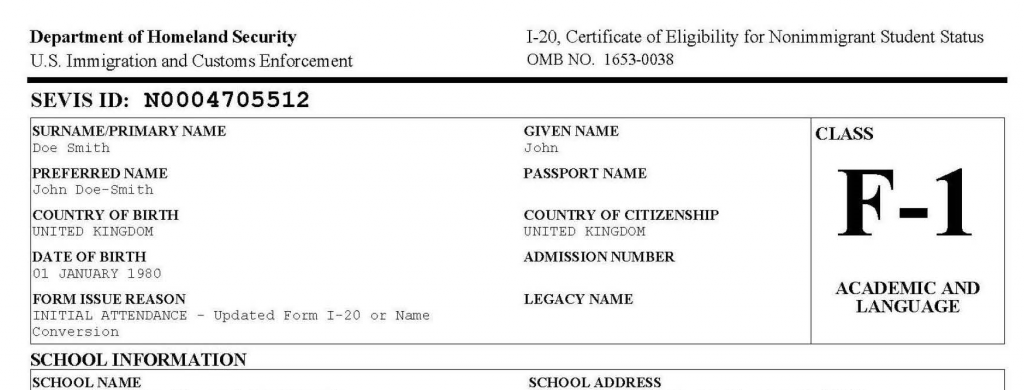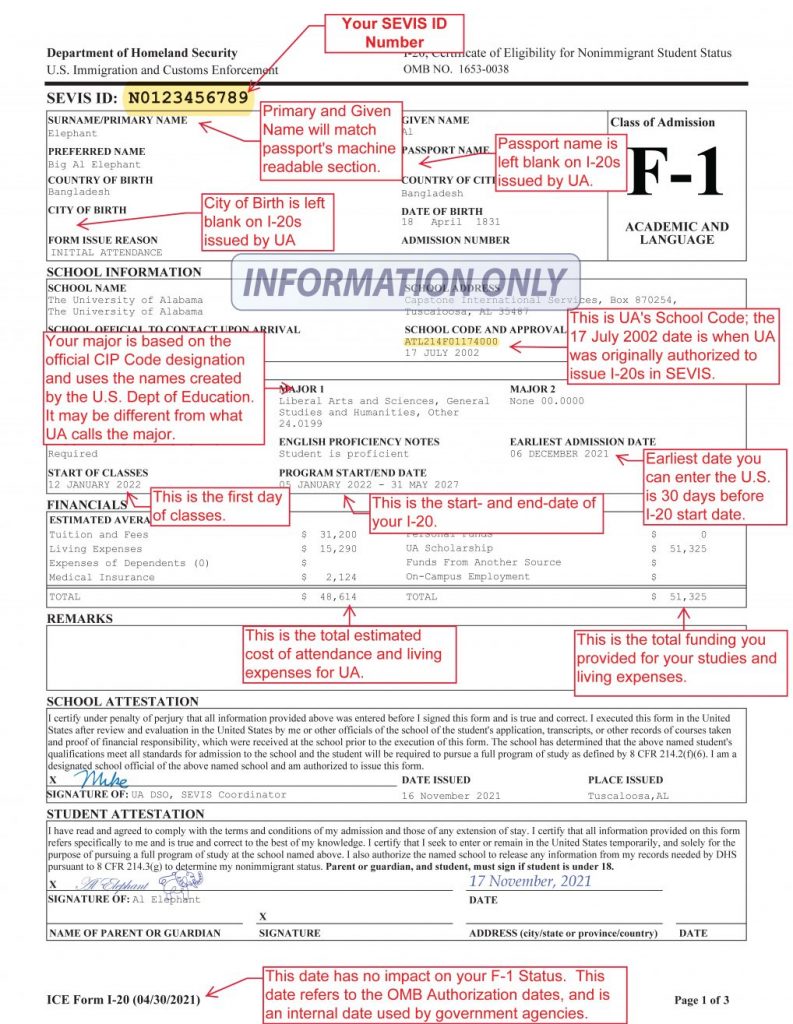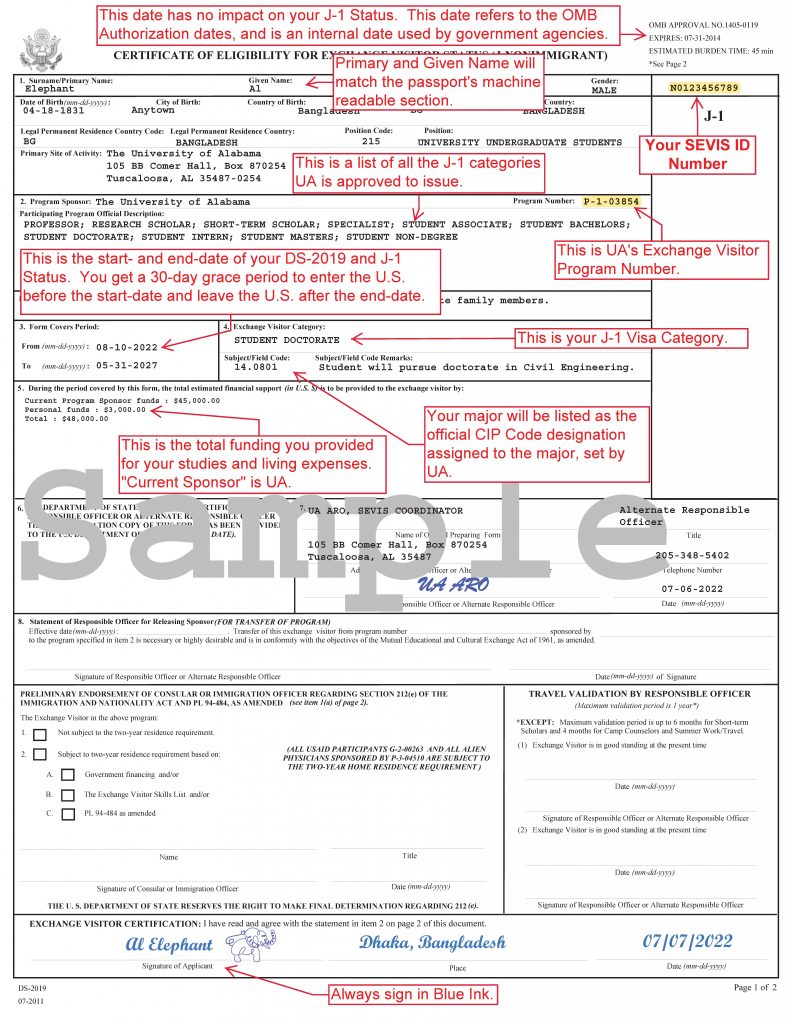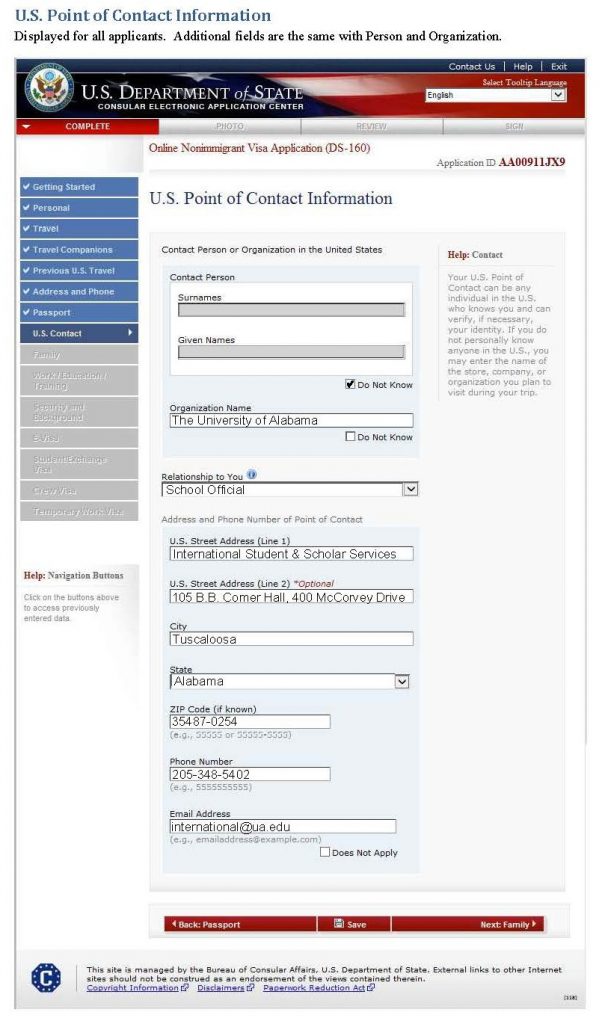Visa Interview Preparation
Documentation Required for the Visa Interview – Generally, you should prepare the following documents before your visa interview:
- Passport – Your passport must be valid for at least six months beyond your period of stay in the United States (unless exempt by country-specific agreements).
- Nonimmigrant Visa Application, Form DS-160 confirmation page.
- Visa application fee payment receipt, if you are required to pay before your interview.
- Photo – You will upload your passport photo while completing the online Form DS-160. If the photo upload fails, you must bring one printed photo in the format explained in the Photograph Requirements.
- F-1 I-20 or J-1 DS-2019
- SEVIS Fee (I-901) Receipt – Make sure to pay the SEVIS Fee at least 3 days in advance of the Visa Interview appointment.
- Admission Letter
- Academic Support Documents – A consular officer will interview you to determine your qualifications for a student visa, and may request additional documents, such as:
- Transcripts, marksheets, diplomas, degrees, or certificates from schools you attended; and
- Standardized test scores results (TOEFL, IELTS, GRE, GMAT, ACT, SAT, etc.) used for admission to your degree program.
- Proof of non-immigrant intent – You will need to establish your intent to depart the United States upon completion of the course of study (see “Proving non-immigrant intent” below)
- Proof of funding – You need evidence of how you will pay all educational, living and travel costs for your first year (scholarships, loans, bank statements) as well as how you anticipate paying for your study and living expenses beyond the initial year (evidence that the scholarships, loans, or funding will be available to you on a continuing basis).
Please refer to the U.S. Department of State Web site for more guidance:
• F-1 Students
• J-1 Students and Exchange Visitors
You should also consult your U.S. Embassy or Consulate – http://www.usembassy.gov/ to see if there are any additional country-specific visa application requirements.
Visa Interview Tips
*Adapted from NAFSA’s 10 Points to Remember When Applying for a Non-immigrant VISA
1.Proving Non-Immigrant Intent
F-1 and J-1 visas are considered non-immigrant visas. Accordingly, during the student visa interview, applicants must establish their non-immigrant intent to the satisfaction of the consular officer.
Non-immigrant intent means that you have binding ties to your home country and have a home which you have no intention of abandoning, and that you will depart the United States when you have completed your studies.
It is impossible to specify the exact form the evidence of non-immigrant intent should take since applicants’ circumstances vary greatly, but generally, “Ties” to your home country are the things that connect you to your hometown, homeland, or current place of residence: job, family, owning a house or apartment, financial prospects that you own or will inherit, investments, etc. As a student visa applicant, the interviewing officer may ask about your specific plans or promise of future employment, family or other relationships, educational objectives, grades, long-range plans and career prospects in your home country.
2. English – The interview will generally be conducted in English and not in your native language. One suggestion is to practice English conversation with a native speaker before the interview, but do not prepare speeches!
3. Speak for Yourself – The consular officer wants to interview you, not your family or an agent, and a more positive impression is created if you are prepared to speak on your own.
4. Know the Program and How It Fits Your Career Plans – Be able to explain to the consular officer why you chose to study at The University of Alabama and specifically in the major or degree program you have chosen.
Graduate students must be able to articulate their research plans and may require additional documentation from your supervising faculty member. If you study/work in a STEM field, we advise you to ask your faculty supervisor to write a letter that briefly describes the specific area of your study/research in layperson’s terms. We have drafted a sample letter and explanation which can be modified by your faculty supervisor. Often the U.S. Consulate will also request the CV and publication list of the faculty supervisor or department chair. We also recommend that you bring the following to the visa interview: a copy of your degree study plan (https://catalog.ua.edu/), transcripts, and a copy of your resume/CV.
5. Be Brief and Maintain a Positive Attitude – It is important to dress nicely and smile during your interview. Keep your answers to the officer’s questions short and to the point, responding precisely to the consular officer’s questions and statements.
The best thing that you can do is to clearly articulate —
- Why you want to go to The University of Alabama
- What you plan to study
- How you plan to use your education when you return home
Be ready to cover this information in no more than about 3 to 5 sentences, and practice saying those sentences with family and friends until you become comfortable with the English.
Here are some of the types of questions that you might get asked:
- Why have you chosen this university?
- Who will sponsor your education?
- Why don’t you study this in your own country?
- Do you intend to work in the U.S.?
- What are your plans after finishing the degree?
- What was your TOEFL score?
If you are denied the student visa, ask the officer for a list of documents they would suggest you bring to overcome the denial and try to get the reason you were denied in writing. For more information about responding to a visa denial, visit the U.S. Department of State’s web page explaining visa denials.
6. Supporting Documentation – There are a few supporting documents which are common among all students such as financial documentation, admission letter(s), and scholarship letters. Students should be prepared to take all documentation proving their financial ability to stay in the United States such as scholarships, assistantships or other letters issued by the school, sponsor or other organization. The financial information indicated on your Form I-20 or DS-2019 should match the evidence provided to the consular officer.
If you will be a graduate student in the United States, consular officials may want a letter from your supervising professor or faculty member that explains your intended research goals (see above).
7. Different Requirements for Different Countries – Applicants from developing countries and from countries where many students have remained in the United States long-term rather than returning home often have more difficulty getting visas. They are also more likely to be asked about job opportunities at home after their study in the United States.
You should review your country’s specific requirements on the U.S. consulate’s website. Also, several U.S. consulates around the globe have created YouTube videos which explain the visa process at their specific posts. Always check your specific U.S. embassy or consulate to see if a new YouTube video is available. A select list of consular YouTube videos is located below as a resource.
8. Employment – While many students work on- or off-campus during their studies, such employment is incidental (secondary/optional) to their main purpose of completing their U.S. education. As a student visa applicant you must be clear about your primary purpose being to study. Also, you must be able to clearly explain your plan to return home at the end of your program.
If you are applying for an F-1 visa and your spouse or children are also applying for an accompanying F-2 visa, be aware that F-2 dependents cannot be employed in the United States. If asked, be prepared to address what your spouse intends to do with their time while in the United States. Volunteering in the community and attending school part-time are permitted activities for F-2 dependents.
9. Dependents Remaining at Home – If your spouse and children are remaining behind in your country, be prepared to explain how they will support themselves in your absence. This can be especially difficult to explain if you are the primary source of income for your family. If the consular officer gains the impression that you intend to support your family with money you may earn during your studies in the United States, your student visa application will almost certainly be denied.
If your spouse or children decide to join you at a later time as an F-2/J-2 dependent, it may be helpful to have them apply at the same post where you applied for your visa, but that is not always required if your family is living in another district. Also remember, F-2/J-2 dependent visa interviews are more challenging when an F-2 or J-2 dependent is filing separately from the F-1 or J-1 student. F-2/J-2 Dependents need to be able to clearly state their reason for joining you, their ties to the home country, and establish their non-immigrant intent.
10. Other Special Considerations
- Tell the truth – do not lie during the interview, as lying is an act of perjury.
- Social media question on the visa application – the “social media” question on Form DS-160, the standard online application used by individuals to apply for a nonimmigrant visa. The item requires applicants to indicate the social media platforms that they have used during the five years preceding their visa application, and to provide any identifiers or handles they used on those platforms.
- Administrative processing delays – Some students may experience delays in obtaining a visa because of “administrative processing.” See informatoin below in our Delays & Denials section. For more information, visit the U.S. Department of State’s Administrative Processing Information web page.
- Past visits to the U.S. – You may be asked to explain past visits and stays in the United States and/or any prior visa statuses held by you or your family members. Also, students who formerly held an employment-based immigration status (H-1B) or had Optional Practical Training (OPT) or STEM OPT might also need to explain the reasons for additional study in the United States instead of working at home.
- Third country applications – If you are not a citizen or permanent resident of the country in which you currently live or the country where you plan to apply for a visa (i.e., you are a “third country national”), you may also have to explain your intent to return to that country upon completion of your studies in the United States.
- Arrests and convictions – Documentation should accompany any arrests or convictions within the U.S. or abroad, including any arrests or convictions for driving under the influence of alcohol or drugs. Always check with an experienced immigration attorney if you have any current or past legal issues.
Visa Interview Video Resources
Many U.S. Embassies and Consulates have prepared YouTube video resources and have extensive social media support for student visa applicants.
Below are a number of videos on various visa applicatoin topics, organized by country location.
We strongly suggest that you follow the social media presence of the U.S. Embassy or Consulate in your home country or place of residence for helpful guidance on the visa application process.
You should also connect with your nearest EducationUSA Center or American Spaces office. They have fantastic resources for you as you prepare for your American education journey.
U.S. Embassy in Dhaka, Bangladesh
U.S. Embassy in Bogota, Colombia
U.S. Embassy in Accra, Ghana
U.S. Embassy in New Delhi, India
U.S. Embassy in Jakarta, Indonesia
U.S. Embassy in Tokyo, Japan
U.S. Embassy in Mexico City, Mexico
U.S. Embassy in Abuja, Nigeria
U.S. Embassy in Manila, Philippines
U.S. Embassy in Riyadh, Saudi Arabia
U.S. Embassy in London, U.K.






